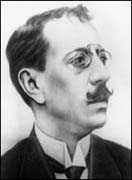Olavo Bilac
| Olavo Bilac | |
|---|---|
 | |
| Born |
Olavo Brás Martins dos Guimarães Bilac 16 December 1865 Rio de Janeiro City, Rio de Janeiro, Brazil |
| Died |
28 December 1918 (aged 53) Rio de Janeiro City, Rio de Janeiro, Brazil |
| Occupation | Poet, journalist, translator |
| Nationality |
|
| Ethnicity | White |
| Alma mater | Faculdade de Medicina da Universidade Federal do Rio de Janeiro |
| Literary movement | Parnassianism |
| Notable work(s) | Poesias, Brazilian Flag Anthem |
Olavo Brás Martins dos Guimarães Bilac (December 16, 1865 – December 28, 1918) was a Brazilian Parnassian poet, journalist and translator. Alongside Alberto de Oliveira and Raimundo Correia, he was a member of the "Parnassian Triad". Elected the "Prince of Brazilian Poets" in 1907 by the magazine Fon-Fon, he is famous for writing the lyrics of the Brazilian Flag Anthem.
He founded and occupied the 15th chair of the Brazilian Academy of Letters, from 1897 until his death in 1918. He is also the patron of the military service in Brazil, due to his campaigns in favor of the conscription.
Life
Bilac was born in the city of Rio de Janeiro, to Brás Martins dos Guimarães Bilac and Delfina Belmira dos Guimarães Bilac. As a young man, he was a brilliant student, gaining acceptance to Faculdade de Medicina da Universidade Federal do Rio de Janeiro at the age of 15.
He began studying medicine, but did not finish the course. He also tried to study Law at the Faculdade de Direito da Universidade de São Paulo, but did not finish the course either. Instead, he found pleasure in writing and journalism.
His first work was the sonnet "Sesta de Nero" ("Nero's Nap") in the newspaper Gazeta de Notícias, in 1884, which received praise from Artur Azevedo.
In addition to poetry, Bilac wrote publicitary texts, chronicles, schoolbooks, children's poetry and satirical works. In 1891, he was arrested at the Fortaleza da Laje in Rio de Janeiro, for opposing the government of Floriano Peixoto.
Bilac would never marry; thus, he never had children. Initially, he was engaged to Amélia de Oliveira, sister of poet Alberto de Oliveira. But their engagement was short-lived, since it was opposed by another brother of Amélia, who said Bilac had no future. He would have an even shorter engagement with Maria Selika, daughter of a violinist named Francisco Pereira da Costa. However, a legend says that Amélia was very faithful to Bilac: she would never marry and, when Bilac died, she put a lock of her hair in his coffin.
Bilac died in 1918. His last words were "Give me coffee! I'm going to write!".
Trivia
In 1897, Bilac lost control of his car, crashing it in a tree. He was the first person that suffered a car accident in Brazil.
Works
- Poesias (1888)
- O Esqueleto (1890 — in partnership with Pardal Mallet)
- Crônicas e Novelas (1894)
- Crítica e Fantasia (1904)
- Conferências Literárias (1906)
- Tratado de Versificação (1910 — in partnership with Guimarães Passos)
- Dicionário de Rimas (1913 — in partnership with Guimarães Passos)
- Ironia e Piedade (1916)
Bilac also translated into Portuguese Wilhelm Busch's Max and Moritz, under the name As Travessuras de Juca e Chico (Juca and Chico's Pranks).
Representations in popular culture
Bilac was portrayed by Rui Minharro in the 1999 miniseries Chiquinha Gonzaga, and gives his name to a character portrayed by Carlos Alberto Riccelli in the 2006 film Brasília 18%, directed by Nelson Pereira dos Santos.
External links
| Wikisource has original works written by or about: |
| Portuguese Wikisource has original text related to this article: |
- Bilac's translation of Max and Moritz online (Portuguese)
- Bilac's biography at the official site of the Brazilian Academy of Letters (Portuguese)
| Preceded by Gonçalves Dias (patron) |
Brazilian Academy of Letters - Occupant of the 15th chair 1897 — 1918 |
Succeeded by Amadeu Amaral |
|